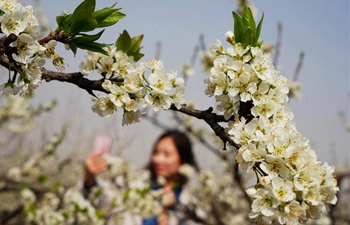CHANGSHA, April 17 (Xinhua) -- Hauling garbage has become Shi Chengfu's biggest hobby. The more he dumps, the happier he is.
For the past half century, the shoulder pole was always a symbol of heavy manual work for 80-year-old Shi. But he has taken up the tool again as the rural tourism industry brings visitors -- and their trash -- to his family's village restaurant. He uses the shoulder pole to transport garbage cans from the restaurant to a nearby disposal site.
His home village, Shibadong in central China's Hunan Province, is a Miao minority village and typical in its scarcity of arable land and water. When he was in his 20s, Shi had to collect rock ash in the mountains and carry it to town to sell as fertilizer.
At daybreak, he would carry two baskets of rock ash on a shoulder pole, walk hours on the narrow road along the cliff edge, and exchange them for a bag of rice. It was usually after 7 p.m. when he got home. As soon as he finished eating, he had to enter caves in the dark to dig rock ash for the next day.
Since China's reform and opening-up were introduced 40 years ago, the mining industry has developed to improve local infrastructure and quality of life. Shi put his shoulder pole away and became a mining worker.
In the meantime, young people in the village, including Shi's son, migrated to work in cities. Shi was left alone. To liven up his retirement, he used his shoulder pole to carry corn that he grew to town to make some pocket money.
Life was not difficult for Shi, but he was far from prosperous.
In 1994, the area was established as the province's main "battlefield" for poverty alleviation, bringing more investment and talent.
Poor in resources, but rich in fascinating culture and landscape, the village started supporting industries such as agriculture, Miao embroidery and village tourism.
Shi's son also returned with his wife. The couple opened the village's first hotel and restaurant in early 2015.
In 2017, 260,000 tourists visited Shibadong village, generating revenue of more than 2 million yuan (320,000 U.S. dollars), pushing the village's per capita net income to over 10,000 yuan annually.
Shi's family serves over 30 tables every day on average, earning a gross annual income of about 300,000 to 400,000 yuan. As the number of customers increased, the single trash can in Shi's home could not meet demand. Three big ones were soon added.
Shi has taken charge of emptying the trash cans -- at least five times a day. He has even bought a new shoulder pole for his new responsibilities.
"Unlike carrying rock ash before, I'm happy to use my shoulder pole now, as life is so full of hope," he said.
















